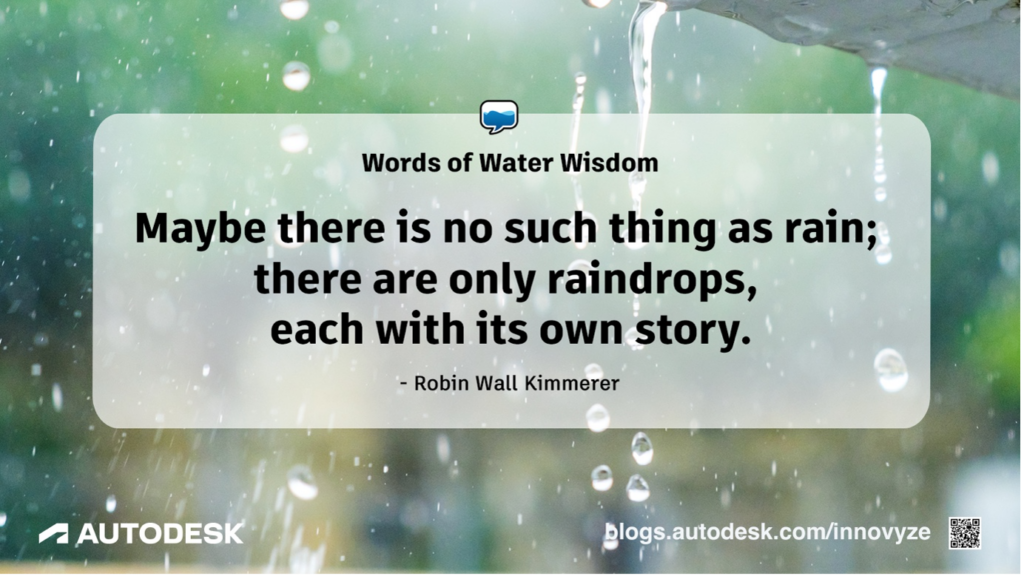From time to time, we like to collect our favorite quotes, sayings, and statistics about water and share them with readers. Today we’re celebrating Robin Wall Kimmerer, Professor of Environmental Science and Forestry at State University of New York College and citizen of the Potawatomi Nation.

Her book of personal observations about nature and our relationship to it, Braiding Sweetgrass’, – Indigenous Wisdom, Scientific Knowledge and the Teaching of Plants, has been on the NY Times bestseller list as a paperback for an astounding 130 weeks. Its message keeps reaching new people, having been translated so far into nearly 20 languages. Her book reached another impressive milestone last week when Kimmerer received a MacArthur “genius grant”.
Kimmerer combines the indigenous wisdom she’s learned over the years with her scientific training to find a balance between systems-based thinking and more thorny points of ethics that need to be considered if we want to meet the needs of every individual in a community. This quote from the chapter “Witness to the Rain”, comes from a meditation during a walk in the rain through the forest.
“I close my eyes and listen to the voices of the rain. The reflecting surface of the pool is textured with their signatures, each one different in pace and resonance. Every drip it seems is changed by its relationship with life, whether it encounters moss or maple or fir bark or my hair. And we think of it as simply rain, as if it were one thing, as if we understood it. I think that moss knows rain better than we do, and so do maples. Maybe there is no such thing as rain; there are only raindrops, each with its own story.”
– Robin Wall Kimmerer
She speaks about each drop’s path as completely different, interacting with a multitude of organic and inorganic matter along the way, sometimes becoming bigger or smaller, sometimes picking up detritus along the way or losing some of its fullness. Kimmerer reaches a place where she’s in tune with nature. We can almost hear the landbound journey of the raindrops along with her.
Where will the raindrops land? Where will they go? How will they change on their journey? By observing, studying, paying attention to the granular journey of every individual member of an ecosystem, we can be not just good engineers – of water, of land, of food production – but honorable ones.
The honorable harvest
Many of her arguments rely on this concept of honor, which is what she thinks we’ve abandoned in our public policies. When we take from the land, she wants us to insist on an honorable harvest, whether we’re taking a single vegetable for sustenance or extracting minerals from the land. She puts it wonderfully in this talk: “It’s not the land which is broken, but our relationship to the land.”
The solution? She thinks it’s all about restoration:
“We need acts of restoration, not only for polluted waters and degraded lands, but also for our relationship to the world. We need to restore honor to the way we live, so that when we walk through the world we don’t have to avert our eyes with shame, so that we can hold our heads up high and receive the respectful acknowledgment of the rest of the earth’s beings.”
This point of view isn’t all that radical. It’s based on common sense, on things we may have known at one time about living in concert with our surroundings, but that modern life and its irresistible conveniences have clouded. At root, Kimmerer is seeking to follow “an ancient model for new pathways to sustainability”.
Are we listening to the raindrops?
In her talk, she references another scientist and naturalist we’ve covered before, Aldo Leopold. They feel like kindred spirits. Both seek to combine their scientific, technical training with the feeling of connectedness and wholeness they get from being immersed by nature to bring about a more balanced way of living with the land.
Kimmerer believes that the connections in the natural world are there for us to listen to if we’re ready to hear them. As water professionals, can we look closely enough at the raindrops to learn from them and respect the careful balance of these interactions when we design and build the infrastructure we rely on?
As she says: “We are all bound by a covenant of reciprocity: plant breath for animal breath, winter and summer, predator and prey, grass and fire, night and day, living and dying. Water knows this, clouds know this.”
Other wise water articles
- Beavers are back – and that’s a good thing. Read about the Planet saving power of ponds and how they can help against climate change.
- The categories of reused Water: recycled, reclaimed, toilet-to-tap? What are the differences?
- Lawns are wasteful – and expensive. Are you ready to ditch your lawn and save 50,000 gallons of water?